-
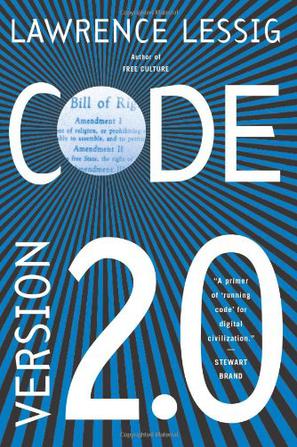
Code
The "alarming and impassioned"* book on how the Internet is redefining constitutional law, now reissued as the first popular book revised online by its readers (* New York Times ) There's a common belief that cyberspace cannot be regulated-that it is, in its very essence, immune from the government's (or anyone else's) control. Code , first published in 2000, argues that this belief is wrong. It is not in the nature of cyberspace to be unregulable; cyberspace has no "nature." It only has code-the software and hardware that make cyberspace what it is. That code can create a place of freedom-as the original architecture of the Net did-or a place of oppressive control. Under the influence of commerce, cyberpsace is becoming a highly regulable space, where behavior is much more tightly controlled than in real space. But that's not inevitable either. We can-we must-choose what kind of cyberspace we want and what freedoms we will guarantee. These choices are all about architecture: about what kind of code will govern cyberspace, and who will control it. In this realm, code is the most significant form of law, and it is up to lawyers, policymakers, and especially citizens to decide what values that code embodies. Since its original publication, this seminal book has earned the status of a minor classic. This second edition, or Version 2.0, has been prepared through the author's wiki, a web site that allows readers to edit the text, making this the first reader-edited revision of a popular book. -
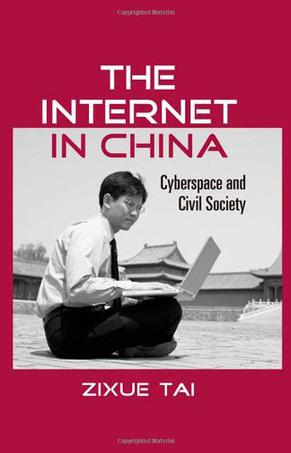
The Internet in China
The Internet in China examines the cultural and political ramifications of the Internet for Chinese society. The rapid growth of the Internet has been enthusiastically embraced by the Chinese government, but the government has also rushed to seize control of the virtual environment. Individuals have responded with impassioned campaigns against official control of information. The emergence of a civil society via cyberspace has had profound effects upon China--for example, in 2003, based on an Internet campaign, the Chinese Supreme People's Court overturned the ruling of a local court for the first time since the Communist Party came to power in 1949. The important question this book asks is not whether the Internet will democratize China, but rather in what ways the Internet is democratizing communication in China. How is the Internet empowering individuals by fostering new types of social spaces and redefining existing social relations? -
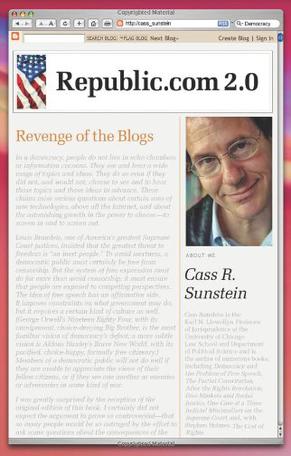
Republic.com 2.0
In this follow up to Republic.com, his first appraisal of technology's effect on public discourse, University of Chicago Law School professor Sunstein waxes pessimistic about today's "nightmare" of limitless news and information options-and, more significantly, the limitless options for avoiding it. Gravitating toward those newspapers, blogs, podcasts and other media that reinforce their own views, citizens carefully filter out opposing or alternative viewpoints to create an ideologically exclusive "Daily Me." The sense of personal empowerment consumers gain-and subsequently equate with "freedom"-only fuels the "echo chamber" effect, which replaces a sense of democratic unity with accelerating polarization. Sunstein argues that the most obvious dangers of this effect-single-minded terrorists and hate groups who use cyberspace to communicate directly with receptive audiences-hide the more subtle and far-reaching consequences of the "growing power of consumers to 'filter' what they see": not only do diverse publics need to hear multiple voices, they also must cultivate a culture "where people actually want to hear what others have to say." This perceptive volume effectively illuminates the contradictory impulses at the heart of the citizen-consumer, demonstrating how "there can be no assurance of freedom in a system committed to the Daily Me"; though challenging and thought-provoking throughout, Sunstein's chapter of partial solutions proves underwhelming. -
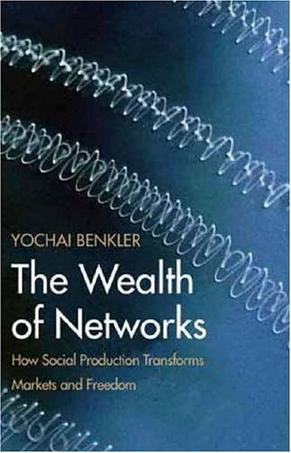
The Wealth of Networks
With the radical changes in information production that the Internet has introduced, we stand at an important moment of transition, says Yochai Benkler in this thought-provoking book. The phenomenon he describes as social production is reshaping markets, while at the same time offering new opportunities to enhance individual freedom, cultural diversity, political discourse, and justice. But these results are by no means inevitable: a systematic campaign to protect the entrenched industrial information economy of the last century threatens the promise of today’s emerging networked information environment. In this comprehensive social theory of the Internet and the networked information economy, Benkler describes how patterns of information, knowledge, and cultural production are changing—and shows that the way information and knowledge are made available can either limit or enlarge the ways people can create and express themselves. He describes the range of legal and policy choices that confront us and maintains that there is much to be gained—or lost—by the decisions we make today. -
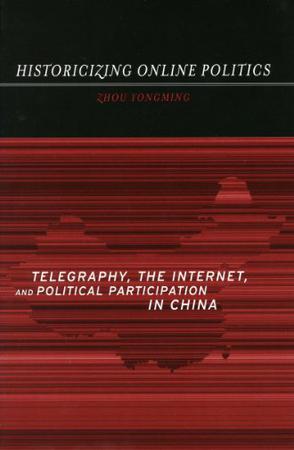
Historicizing Online Politics
It is widely recognized that internet technology has had a profound effect on political participation in China, but this new use of technology is not unprecedented in Chinese history. This is a pioneering work that systematically describes and analyzes the manner in which the Chinese used telegraphy during the late Qing, and the internet in the contemporary period, to participate in politics. Drawing upon insights from the fields of anthropology, history, political science, and media studies, this book historicizes the internet in China and may change the direction of the emergent field of Chinese internet studies. In contrast to previous works, this book is unprecedented in its perspective, in the depth of information and understanding, in the conclusions it reaches, and in its methodology. Written in a clear and engaging style, this book is accessible to a broad audience. -
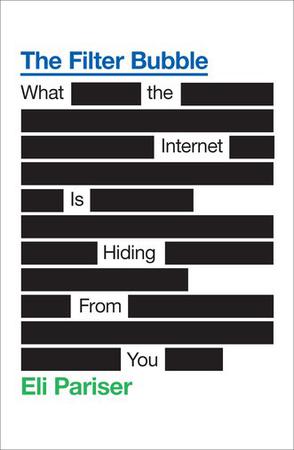
The Filter Bubble
In December 2009, Google began customizing its search results for each user. Instead of giving you the most broadly popular result, Google now tries to predict what you are most likely to click on. According to MoveOn.org board president Eli Pariser, Google's change in policy is symptomatic of the most significant shift to take place on the Web in recent years-the rise of personalization. In this groundbreaking investigation of the new hidden Web, Pariser uncovers how this growing trend threatens to control how we consume and share information as a society-and reveals what we can do about it.Though the phenomenon has gone largely undetected until now, personalized filters are sweeping the Web, creating individual universes of information for each of us. Facebook-the primary news source for an increasing number of Americans-prioritizes the links it believes will appeal to you so that if you are a liberal, you can expect to see only progressive links. Even an old-media bastion like T